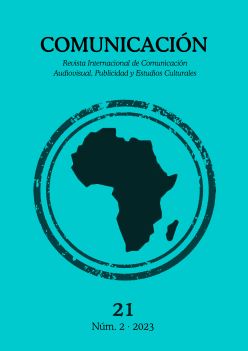Abstract
Through the TikTok profile of Charity Ekezie, this study investigates the use of this platform as an alternative means to combat the negative image associated with Sub-Saharan Africa. The research adopted a quantitative and qualitative approach, intentionally selecting 45 videos that have had the most impact between 2022 and 2023 on the TikToker's profile. The study's objective has been to analyze the topics addressed in the videos generated on Charity Ekezie's TikTok profile, particularly those topics that in some way perpetuate stereotypes about the African continent. The results of the analysis demonstrate that Ekezie's communication is effective in presenting stories from the continent from her own perspective, thereby contributing to the dissemination of positive narratives and changing the stereotypical perceptions that many of her non-African followers have about Africa.
References
Adiche, Chimamanda Ngozi [TED] (7 de octubre de 2009). Chimamanda Adichie: El peligro de la historia única [Vídeo]. https://www.youtube.com/watch?v=D9Ihs241zeg&t=650s
Alsina Rodriguez, Miguel, Dijk, Teun Van, Martinez Granados, Antolín y Wagman, Daniel (2006). El periodismo ante el reto de la inmigración. Convivir sin racismo.
Álvarez, Natalia Terrádez (2020). TikTok: una exploración sobre la difusión de los estereotipos sociales [Trabajo de fin de Master]. Universidad de Valladolid.
Arakpogun, Emmanuel Ogiemwonyi, Elsahn, Ziad, Nyuur, Richard, Olan, Femi (2020). Threading the needle of the digital divide in Africa: The barriers and mitigations of infrastructure sharing. Technological Forecasting and Social Change, 161, 120-263.
Bahia, Kalvin, y Delaporte, Anne (2022). The State of Mobile Internet Connectivity 2022. GSMA.
Bonomo, Mariana y Batista Rangel, Roberta (2017). Representações sociais de imigração e imigrantes em mídia espanhola, italiana e portuguesa. Quaderns de Psicologia, 19(3), 211–227. https://doi.org/10.5565/rev/qpsicologia.1357
Burgos, Bartolome (2007). Culturas africanas y desarrollo: intentos africanos de renovación. Fundación Sur.
Conde del Rio, Manuel Antonio (2021). Estructura mediática de TikTok: estudio de caso de la red social de los más jóvenes. Revista de Ciencias de La Comunicación e Información, 26, 59–77. http://doi.org/10.35742/rcci.2021.26.e126
De Diego, Paolla y Margueliche, Juan Cruz (2012). Construyendo las miradas de África Subsahariana. Un abordaje desde el discurso, UNLP, 14.
Dokotum, Okaka Opio (2020). Hollyhood and Africa: Recycling the Dark continente Myth 1908-2020. AHP publications.
Esteban, Prudencia y Ibáñez, Patricia (2013). ¿Cómo se transmiten los estereotipos culturales y sexistas a través de las imágenes de las tic en los libros de texto? Enseñanza & Teaching,31(1), 109–125.
Florentín, Bernardo (2022). Tiktok. Mundocuenta. https://www.mundocuentas.com/tiktok/#Caracteristicas
Gamarnik, Cora Edith (2009). Estereotipos sociales y medios de comunicación: Un círculo vicioso. Question, 1(23), 1-5, https://perio.unlp.edu.ar/ojs/index.php/question/article/view/826
Granda, Betty Natally (2021). Análisis del uso de la red social tiktok como medio de difusión de contenido audiovisual profesional en Ecuador [Trabajo de fin de Máster]. Universidad Católica de Santiago de Guayaque.
GSMA (2021). GSMA - Representing the worldwide mobile communications industry.
Hafaouni, Noura Elfassi (2022). África en el imaginario occidental: Imagined Western Representations of Africa. Revue Des Sciences Humaines et Sociales de l’Académie Du Royaume Du Maroc, 1, 120–126.
Hall, Sandra (2022). Digital report 2022: el informe sobre las tendencias digitales, redes sociales y mobile. We Are Social. https://wearesocial.com/es/blog/2022/01/digital-report-2022-elinforme-sobre-las-tendencias-digitales-redes-sociales-y-mobile/
International Telecommunication Union (2022). Global Connectivity Report 2022. https://www.itu.int/hub/publication/d-ind-global-01-2022/
ITU (2021). Digital trends in Africa 2021: Information and comunication techology trends and developments in the Africa region 2017-2020. ITU Publications.
Lima, Marcus y Pereira, Marcos (eds.) (2004). Esteriótipos, preconceitos e discriminação: perspectivas teóricas e metodológicas. UFBA editora.
Lippmann, W. (2008). Opinião Pública. Vozes.
Macedo, Jose Rivair (2008). Desvendando a história da África. Editora UFRGS.
Melo, M. (2011). A áfrica nas telas: A indústria do cinema contemporâneo e sua cultura histórica eivada de estereótipos colonialistas. ANPUH, 14.
Monteiro, Jean Carlos (2021). Aprendizagem criativano tiktok: novas possibilidades de ensinar e aprender durante o isolamento social. Open Minds, 2, 47–53.
Neves Rodrigues, Liberia y Santomauro Gonçalves, Jéssica (2018). A importância da literatura africana no ensino da história e das culturas da áfrica: a desconstrução da ideia de um continente genérico. Triângulo, 11(3), 87–99.
Permana, I Putu Hendika y Meinarni, Ni Putu Suci (2021). Ratio Analysis on Tiktok (Social Media) for Qualitative Research Using Explorative Methods. Jurnal Ekonomi dan Bisnis Jagaditha, 8(1), 30–38. https://doi.org/10.22225/jj.8.1.2944.30-38
Santos Sanchez, Paula (2022). El uso de TikTok por parte de los medios comunicación españoles. Universidad Francisco de Vitoria. http://ddfv.ufv.es/handle/10641/3060
Thomaz, Fernanda (2022). Um breve passeio pela história e culturas africanas. Editora UFJF.
Torres Maques, Ana Teresa (2019). A utilização das redes sociais digitais enquanto forma deinfluência Líderes de opinião digital: o caso de Mafalda Sampaio [Dissertação de Mestrado]. Escola superior de tecnologia e gestão.
Verdú Pastor, Jaime (2012). Eurocentrismo, Europeismo y Eurofobia. UNAM, 14.
We Are Social (2023). Digital 2023 global overview report: the essential guide to the world`s connerc behaviors. https://datareportal.com/reports/digital-2023-global-overview-report

This work is licensed under a Creative Commons Attribution-NonCommercial-ShareAlike 4.0 International License.
Copyright (c) 2023 Natercia Luisa Lazaro, Alejandra Walzer Maskovic

